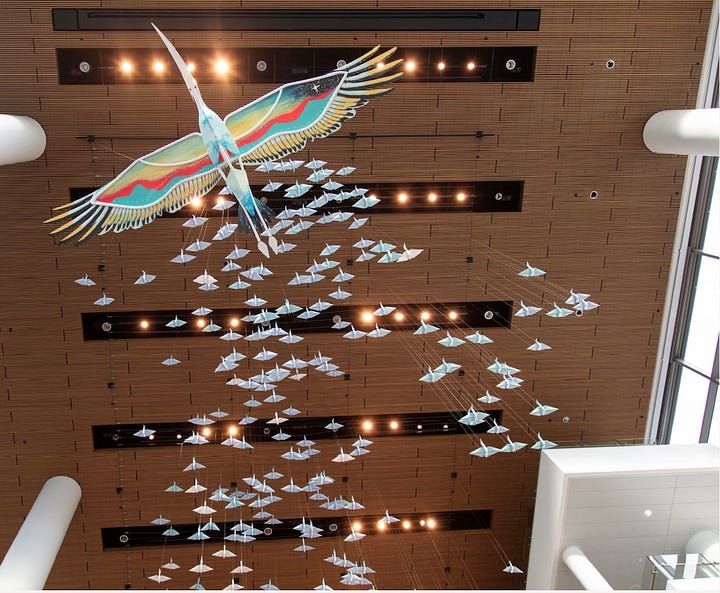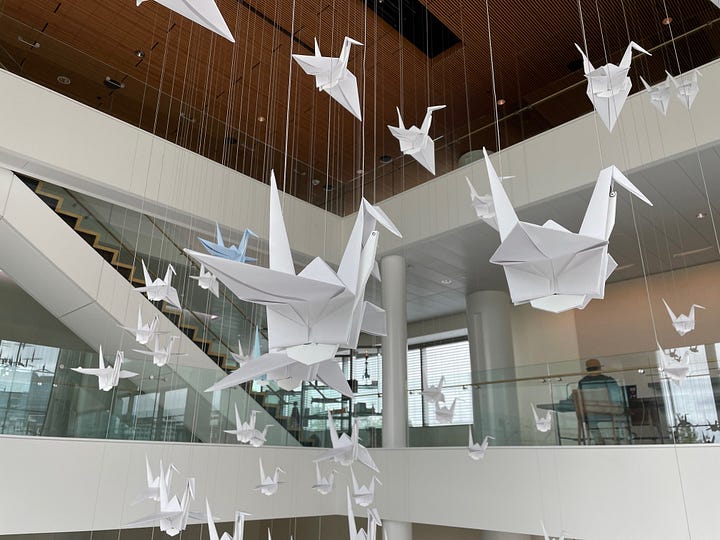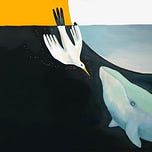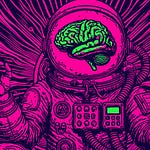Everyone* (*yes, you) is creative at the core. FREE THE IDEA provides tips, tricks, and support to help you get ideas out of your head and into the world. Become a FREE subscriber below.
Jill is one of the more enthusiastic creators I know, and sets a great example of “being kind to her creative self.” Listen in as Jill and I discuss her (ongoing) creative journey; the value of collaboration; and how creativity is not a luxury, but a necessity for all of us.
Below is some of the work Jill mentions during the podcast. For more information on her work visit: jilldryer.com
—


—
—
What part(s) of the podcast resonated with you? Please share as it could help others in their quest to free an idea:
—
Transcript to the podcast:
Jill (00:00)
Welcome to the Free The Idea podcast. I'm your guest, Jill Dreier.
TODD BEEBY (00:04)
And I'm your host, Todd Beeby.
thanks for joining me today. This podcast is about helping people exercise their creativity. And I'm going to use this word, exorcise their ideas. So this is basically getting those ideas out of your head and into the world. We don't want them to fester in there for too long because Lord knows we've all got stuff that's been in there for maybe almost decades,
Jill (00:27)
I think where we're stuck is just that we have our own personal resistance so often and there's resistance everywhere outside in the world. So I feel like if you can access your creative channel and access the creativity that lives within you and that can tap into other creative flow, then the ideas are not being restricted somewhere. We put walls around ourselves like, that's not good enough, or I couldn't possibly, or I can't write a rock musical. I'm just a weirdo in
TODD BEEBY (00:51)
Tell me a bit about how you are taking down your own barriers and just putting stuff out there because you have a long tradition of that.
Jill (01:03)
Well, I'll tell you how my big free idea got stuck in a cage. I had been working on a rock musical called Dream for at least 15 plus years. And when it arrived, I would say that arrived like a flow. Like I spit out the story, I woke up one day and the story came to me. And that was great. In the creative land, that was a beautiful thing. And for a long time, it flowed like song and song after song. And then over the years,
I started to try different things with it and think, talk to other people and they would say, well, this has to be on a stage or let's put this thing toward Broadway. So over time, I'll fast forward very quickly to like a recent iteration of the show.
I did a version of it and was able to perform a song on stage with quite a few people. And that was an extraordinary experience. Like to see, have your work performed with others was super exciting.
But I realized
got stuck in the literal interpretation of the story. I mean, the story itself lives within me and is all about wanting to do breakthrough work and wanting to get to the other side of your fear. That's literally what this story is all about. Following a dream is about literally walking past all the, everyone who says you can't do it and doing it anyway.
So this past year after I did the stage ⁓ performance of the finale song,
I had kind of a post-marathon crash, you know, like, I just gotta put this away for a little
really need a break. And ⁓ at that time, my producer is a guy named Liam Davis, who's awesome. And he wanted to ⁓ start a masterclass of storytelling and songwriting called Songtellers.
And he said, you know, I need a couple of people to be in the pilot crew of what we're doing here and what we're trying to do is
to create breakthrough work. He's like, my goal is to get us to make things we've never made before and to literally push yourself to just, everybody gets in ruts creatively and you just keep pushing to the same thing. So what has literally happened over the past few months is I just started making stuff in all these different directions. So the spaghetti on the wall approach, he'd give us a prompt every week and I'd write a song ⁓ along with my classmates about anything and everything. It could be like, you can only use the key of D.
or this week we have to go over here in third person and ⁓ tell a story about a cowboy or whatever. It was just all kinds of weird prompts that would let us to make stuff that was out of the ordinary for ourselves, things that we would never do. And along that path, ⁓ I started to unfold a new story that was about a crow and a whale. And the image that I sent you has a little line ⁓ where the crow is diving into the water and the whale is coming up from beneath.
So the short version of that breakthrough story is that the crow has always been told it can't be done by all the crows that live above land and that there's nothing below. It's just darkness and it's gonna swallow you up and it will take you. And the whales have always believed there's nothing above the surface. So finally this crow, one lone crow decides to just take the wild leap and do it anyway. And so the crow takes the plunge and all of this music I've been writing
It's just literally metaphorical about this crow's journey of getting through to the other side and the joy that the crow feels when she gets to the other side and she's not only not dead, she's thriving and there's this whole new world and it's magical and she isn't coming back.
this embodies all these things that we're talking about, about getting past not only your own personal resistance, but everyone else that's like, well.
you're probably not going to be able to be an artist or it's probably not going to make a good living or probably not going to make it to Broadway. Only one out of 80 billion people make it. And these are the things you have to transcend in life to keep creating.
TODD BEEBY (04:48)
We're talking about all these no's that you come up against, because even there's enough of them in our own heads, right? And then we finally get over ourselves and get the idea into the world in some format. And you're kind of fixated on this, like, my god, it's got to be Broadway. And I think it's going be amazing. I can just see it up there.
Do you have to believe in it so much that like other people start believing in it? Because a lot of times they're going to be, you know, pretty reluctant to believe in your belief system, right?
Jill (05:27)
Yeah, I think in this version ⁓ of Crow and Whale, in making it, I feel absolutely at peace and released of all attachment. I don't care. I just know that I want to make it and it feels amazing. And that for me is the breakthrough of this last few months, because while I think it's still a great story, and it can be told and I will tell it, ⁓ I feel zero pressure this time. And I think it's like, have no agenda with this.
I'm gonna make it ⁓ even my husband thinks it's the best work I've made so far. It's kind of like a prog rock journey. It's like everything I loved in the 70s and 80s baked into my music. ⁓ But I think just taking away the goalpost, which I find ironic, since I've forever been preaching about following your dreams. And honestly, I'm finding that the most intimidating thing was the goalpost itself. And I think I
I got lost on the way to my own dream road by thinking there was just this one path and there's not. And it's literally just, I love making so much that I'm back on the journey again. And I almost think that I'm afraid of putting it out there because I love making it so much that I don't want the journey to end. I don't know if that's something that other people experience when maybe success feels.
It will however you define success if it's going the distance to something or reaching some pinnacle. But then that means the journey is over
TODD BEEBY (06:55)
Obviously this new path is something that really resonates with you, but ⁓ I don't know, is there any like insight or creative advice from that experience that you think could apply to people who aren't writing a prog rock opera?
Jill (07:12)
One of the exercises we did in the songwriting class was my favorite by far. It was literally ⁓ sit down and hit the record button and just go. And I thought that that would be like the dreaded blank canvas that many creatives find. What I found was the other, which was, I just made music and of course there was imperfect and there were, but I made better music.
I'm still doing it. I just hit record and I play something and then I later go back to it and maybe tinker. But I think when you're making, I think it's great to sit down and just create whether it's writing or painting or music and just make a thing. It doesn't have to be perfect. Give yourself 30 minutes. Do it in small increments. That's another thing from our songwriting class is that instead of torturing yourself and working out all weekend, we sort of blurred out things and little spurts of like, here's a 30 minute thing I worked on.
And of course we're careful about how we critique each other and because it's not really a critique, it's more like, okay, what was interesting in here and that we can steal for another project. But I think if you break it up into smaller pieces instead of setting out to make the rock musical, these little pieces are so much more fun and they have less risk. then, and so maybe just that's one way to approach creativity. I mean, you can't sit down and say, I'm going to make the best painting of my life right now.
This is going to be my best work. I'm just going to paint it today. It would be really intimidating and really unsatisfying, especially when it wasn't perfect after 10 minutes.
TODD BEEBY (08:36)
That 25 minute thing, 30 minute thing reminds me of tomato timers. And I've made my own called the free timer. And it's basically like you do have the time to do this thing and you do it by doing it one little step at a time. Like, some artists do sketch of a painting before they even begin. But to put all that stress on yourself anyway that the product and the output has to be good at first It just has to be a little tiny increment So 25 minutes at a time and then you get a break and if you want to keep going great if you don't don't That's kind of like even when you get that bolt of inspiration Which you got the first time it helps to like just remember that we're human and then we can only do so much at a given time something about those like, footsteps to me that are actually just true to being human.
Jill (09:30)
humbling, of course, and you can still do great work, but ⁓ also you don't have to go it alone. You don't have to just make everything yourself. I think ⁓ you add in the collaborative element and you get another jolt of inspiration. ⁓ I've listened to your podcast with your friend, the drummer. It's like, once you start collabing with other people, it starts taking on a whole new life. And that's exciting too.
just don't put that pressure on yourself that you have to be all things. I I think I set out to work on the musical and get as far as I could by myself. And I certainly, of course, reached a plateau of like, I can't do much more from here. I need other collaborators and people
TODD BEEBY (10:10)
Yeah, energy is key. And yeah, I think it's almost unfair to suggest. I mean, there are those artists, and you've done work like this before in your life, where you've done these amazing paintings, you've done works for
Foundation, which we'll talk about in a minute. And there are things which you have to work with other people as far as literally fabricating the idea. that idea that you have to go alone is pretty odd. And like I said, some art kind of requires it maybe. But other times, it's critical. Because this podcast, the times I try and do it myself, it is terrible. There's no energy. It's just me in a room
But yeah, just having another human there to interact and just, you know, provide another perspective is pretty key.
Jill (10:52)
That all just leads to being playful at all times when you approach your creativity. It's literally, yes, I believe everyone has it. And I think if you can get yourself in a playful mindset and spend 25 or 30 minutes doing something fun, then something interesting will come of it.
you and I, having a friend to kick around things with and joke around, it sort of gets you out of that.
serious brain space. ⁓ That's just the, I think that's the killer. At least for me, as soon as I get too serious about it and too literal, all of the beauty goes away.
TODD BEEBY (11:24)
right? Because we think that it has to be a financial success or whatever we ideate has to somehow have this money making component, which is pretty crazy because that's very, very rare. Do you think that, it sounds like you believe everyone is creative.
Jill (11:41)
Yeah, I definitely do. I do. I think we're often unencouraged as young people. Is that a word?
TODD BEEBY (11:48)
And where do you think that where's the discouragement or unencouragement coming from?
Jill (11:53)
Well, I think if people haven't allowed themselves to be creative or encourage themselves, they maybe don't know how to, let's say it's parents, offer that support, if that's not their road or they haven't been allowed it. I think people often believe that creativity is a luxury and I don't think it is. I think that there's such a weird, ⁓ it's probably Western society here, it has such a strange relationship with creativity that whether it's the Hollywood people and they're the lucky ones that go on and do that or...you know, few musicians that make it. And I just don't think that's true at all. It's not a luxury. It's literally how people live their lives and it's a path that they choose to be on or it's a piece of their soul and their whole journey here on the planet.
TODD BEEBY (12:39)
Do you believe everyone believes they're creative?
Jill (12:43)
No, not at all, but ⁓ I think with some just ⁓ nudging and encouragement, they can get there. it doesn't, again, you don't start out with a masterpiece, you start out with a lot of small steps. so maybe a lot of people often said to me, well, I can't, I don't paint, I'm not like you, I don't do that, or I don't write music. And that doesn't mean that you can't be a great cook and creative or great anything, know, basketball player or whatever your joy is. Like that's very creative. And it's literally creative is how do you ⁓ let your spirit live in the world and how do you travel through and what is the best iteration of it.
TODD BEEBY (13:20)
“Creative” as a word is kind of supposedly was previously reserved for certain people, right? And it was in their title or whatever.
Jill (13:31)
Right.
TODD BEEBY (13:32)
But then it's also like, what is it that I could possibly create? And we need to expand what our definition of that. And that's why we're getting into things like sports and other ways to physically manifest your joy. And I think a lot of people, including me, are a little bit cynical about the joy thing. And we're just kind of like, I don't know. Like, I'm not a painter or the musician like you are. And it's like, well, what's holding most people back, do you think?
Jill (13:56)
I mean, I think most people are afraid that it won't be received well because there are plenty of times in life that you know from putting things out there and, and especially in our overly engaged digital society, you know, it's very, we have a really critical society right now. I'll, I'll go ahead and make it just a giant blanket thing, but I feel like, ⁓ there's just a constant criticism of people's bodies, people's abilities, people's, you know, looks, all the things.
And I think it makes you really recoil versus wanting to express yourself. And, you know, I don't like to think that the only magical thing is summer camp in life, but I always go back to like things like summer camp because you're out in the wilderness, you're outside all the time, there weren't any phones or any digital anything. You're running around with kids your age and you just have these like life altering experiences with which are literally making God's eye, you know, crafts or swimming in but you're just literally yourself, your authentic self. And I think we all want to get back to what is our authentic self. You get it a few times in life. Often you're about seven and you feel really great about yourself and no one has convinced you otherwise yet. And so, yeah, I think people are tender because they've been shown a lot of criticism all over the place. And I still, I still as an artist, I was a lifetime artist, I still get criticism all the time or, someone says, “you can't do that.” ⁓ But I mean, it's silly to me now. I only laugh about it because I just feel like, yeah, but I am doing it.
TODD BEEBY (15:32)
I was walking around the other day I saw this young person wearing a awesome hoodie and the back of it says, your fear of looking stupid is holding you back. And I thought that was really cool. was like, a good reminder from someone who was probably in their late teens to get back to that kind of camp space or that seven year old space where you are literally anything you want to be because you have not been literally, you know, kind of beat up as the
Jill (15:59)
I want to make it a mantra to root for everybody to get back out there because what can be more fun than just ⁓ expressing yourself and trying new things and it should be an absolute positive experience to just make things and create with your hands and use your brain, whatever you got.
TODD BEEBY (16:19)
We talk about this kind of anti-aging serums and all that stuff, right? It's like, what can I apply to my skin to make me feel younger and look younger? It's like, well, maybe it's not something external. Maybe it is actually brain based where one gets out of their comfort zone and does something a little kooky, crazy or different. I mean, I took a dance class a few months ago. Ridiculous to even watch.
Jill (16:41)
What kind of dance?
TODD BEEBY (16:42)
I was freestyle, Jill. more of a I'm a foot planted on the ground, firmly on the ground, as you've seen, like I'm more of maybe upper body movements and not necessarily in time. this this instructor said to me, she said, just she's like, dance to the back row. And that really stuck with me because he's like, you're not here to be timid and to be navel gazing and shy. And that's my personality. she's like, dance to like you're dancing to the people in the back row. you're gesticulating and moving and taking up space and being, you know, crazy with your movements. I would something I would never do. And since then, when I'm doing like an edit thing that is has dancing going on, I'm like, all right, I'll dance to the upper deck. Because like, why not? Like, what's the what's keeping me from doing that? Now that I know this, quote unquote, secret, I'm going to give it a shot.
Jill (17:34)
Yes! Dance to the back row! Do it all. mean, especially we're old enough that we don't care. That's the best part about getting old. It's like, you don't care as much anymore
TODD BEEBY (17:43)
It’s almost like you start, it's this bell curve, right? Start out with low giving a shit and then you get older and you maximize your giving a shit, probably at the peak of your professional career and then you start giving way less of a shit as you get older. And yeah, I think that's a magical moment. I would hope that we can shift that curve over or flatten it so that everyone can feel like this all the time.
Jill (17:47)
I have one little strange insight to share that I was thinking that have to go through life ⁓ just saying yes to and figure it out later. Like I think the best things I've done creatively are literally when someone said, could you make this for us? And of course I don't know how, but I would say yes and then figure it out and find if I can't do it, I'll find someone else to help me.
TODD BEEBY (18:26)
Yeah, the saying yes to things I think is, is a good thing. And just we just don't I think we say that enough to ourselves. We say to a lot of other people, right?
Then I guess that takes the onus off us.
Let's take a moment to see if there's, you know, space to say yes to the thing. Like if you had an inkling to write a poem, which is always been impenetrable to me, I've tried to write a few recently and I'm like, okay, my goal here is to try and make poetry somehow more accessible. And there's something to that. Because it's a super short story and people's attention spans are short. What are some of the things that you've said yes to recently
Jill (19:01)
Well, it's been a couple years ago when, ⁓ so I have done some work at the Gates Foundation and one of the, I had for years done some small
And then one day I was in the building on their Seattle campus and a person said to me, do you think you could make something in the six story atrium, like hanging from the ceiling? And I'm like, of
I'd never done anything like that. I've been illustrator and a painter. I've never worked in 3D. And I couldn't believe someone asked me such a preposterous, like giant question. But I was like, of course. I mean, I said it really fast. Like, of course.
so many years later, I'm looking back on that. I can't believe I busted out the, of course.
because ⁓ it certainly was a very challenging road, but wow, ⁓ I found incredible people. So the secret was I quickly found myself a team of people that could help me build something and imagine something ⁓ at a giant scale and hanging from a ceiling.
once I took that plunge, I wanna keep approaching things like that because, I mean, maybe I just was feeling extra something that day. But since then, I've tried to approach things with that same philosophy of, of course I can do it. If I can't do it, ⁓ someone I know can and we'll do it together
We're pretty cruel to ourselves as adults.
What would I say to my kid in this moment? You know, if I'm making something and the times that I think, why would I put that music out there that I'm writing right now about Crow and Whale? the hell wants to listen to that? Then I'm like, really, is that what I would say if my kid wrote that?
Be kind to your creative self. ⁓ It needs all the encouragement it can get.
TODD BEEBY (20:42)
That's just a beautiful thing: “Be kind to your creative self. It needs all the encouragement we can get.” I think that's a great way to end it, Jill. Thank you so much for being here.
You're a true tour de force and I love that the conversation today inspired me, hopefully it inspires other listeners that just, it's the little things that add up and I really appreciate your time.
Jill (21:01)
Well, thanks so much for having me. I'm happy to chat with you anytime.
TODD BEEBY (21:05)
All right, cheers.









Share this post